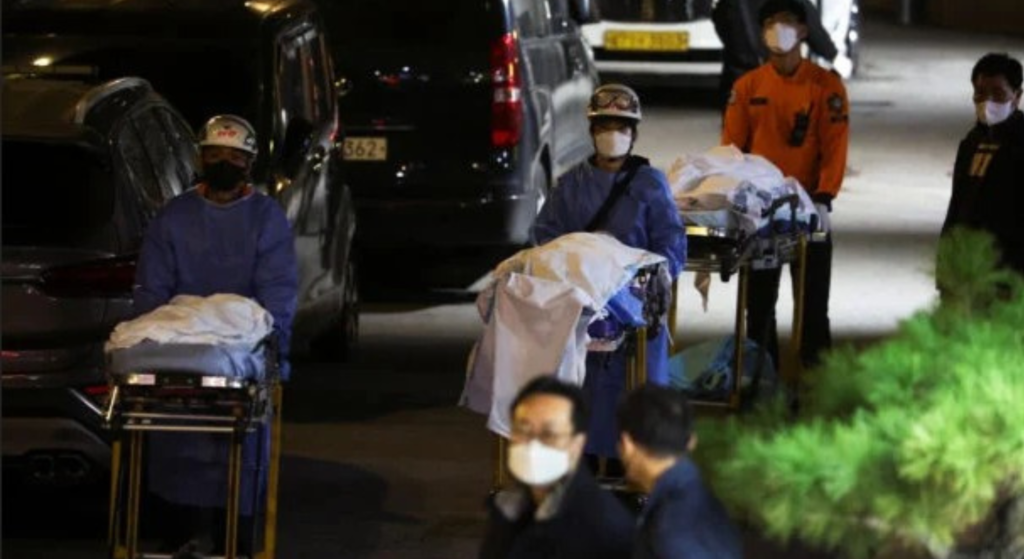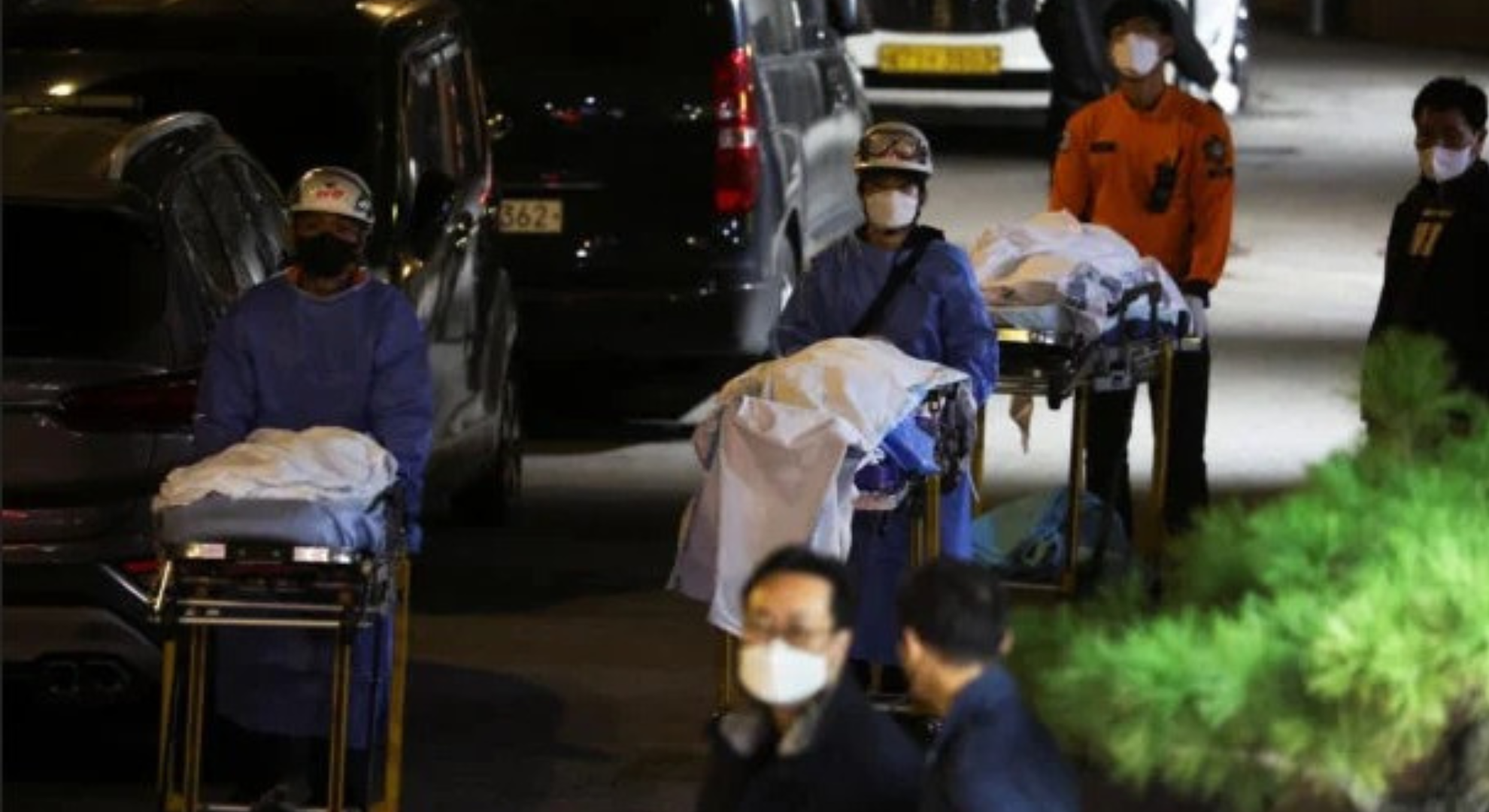The POP! team would like to send our condolences to the bereaved families affected by the tragedy that occurred in Itaewon, South Korea last October 29, 2022.
In a neighborhood famously known for its Halloween festivities, Halloween in Itaewon is now a grim reminder of the tragic crowd crush that killed 156 people and injured many others. Precious lives were lost during a night meant to be filled with fun, laughter, and freedom.

The Itaewon district in South Korea could be considered as the melting pot of cultures in a country teeming with conservatism in every turn. What used to be a safe space for many of the youth who are still finding their way through the conventions of life, now is a devastating symbol of “what could have been” their futures, had that disaster not happened.
What happened during that fateful night was no accident, nor could it even be considered as a stampede. We have to call it as it is—a crowd crush.
These two terms, “crowd crush” and “stampede” may seem similar to one another but believe it or not they’re actually the opposite. It’s important for us to understand the difference and connotations of both words, especially when it comes to grasping the gravity of these kinds of situations.
A “stampede” is a word mostly used to refer to animals that are fleeing from a certain threat. Behaviors exhibited by these animals are often of panic and fear.
According to Professor Edwin Galea, a crowd behavior expert at the University of Greenwich interviewed by The Guardian, “Stampede is not only an incorrect term, it is a loaded word as it apportions blame to the victims for behaving in an irrational, self-destructive, unthinking and uncaring manner, it’s pure ignorance, and laziness…It gives the impression that it was a mindless crowd only caring about themselves, and they were prepared to crush people.”
A “crowd crush”, on the other hand, refers to a situation wherein a crowd becomes so packed and compressed that people in the crowd lose the ability to breathe and are asphyxiated.
Just by watching the triggering videos that had been circulating since the moment the crowd surge was happening, everybody could see how this wasn’t a stampede. People that were entering that narrow street in Itaewon didn’t know of the exact danger that was already happening to the crowd at the front and middle, and the more people that came, the more dangerous it became.
Those viral videos showed that the people were in distress and in fear, and who wouldn’t be in that situation?
The crowd at Itaewon that night was not aware of the tragedy that was already unfolding just meters away from them. They weren’t at fault for what had happened.
G Keith Still, a crowd safety expert at the University of Suffolk in England says this best, “People don’t die because they panic. They panic because they are dying.”
We all have to agree that this disastrous crowd crush could have been very much avoided. And what was missing during that whole thing? Police officers in the vicinity. The authorities confirmed days after that there were only 137 officers in Itaewon at the time, while the rest were controlling a crowd of 25,000 in another part of the district.
For a popular tourist destination that had been filled with more than 100,000 people in the past years for the same festival, it was quite concerning to see such few numbers of authorities doing crowd control.
While the police had already admitted that they were responsible for the tragedy that befell the partygoers at Itaewon, the South Korean government themselves is rewriting the whole narrative as an “accident”. The Ministry of Interior and Safety was first reported by Yim Hyun-su of The Korea Herald to have ordered local governments to use the words “incident” and “deceased” at the memorial altars erected in memory of the victims in attempt to avoid “perpetuating a negative image” of the neighborhood.
In that same article, Yim Hyun-su wrote that Areum Jeong, a researcher who is writing a book after the 2014 Sewol Tragedy, remarked that the government is “downplaying their accountability” through their choice of words.
In these kinds of situations, language plays a huge part in human responses. In using gentle words such as “incident” and “accident” when referring to an event filled with such tragedy and distress, and “the dead” instead of “victims” lessens the profound seriousness of this event.
At the same time, like what Areum Jeong said, it lessens the responsibility held by those people in power when they should be the ones handling everything in the first place. The South Korean public are still reeling from the 2014 Sewol Ferry Tragedy, which greatly affected the youth.
And now, the same generation had been failed by their government twice. Twice.
This is why it’s important to call the Itaewon tragedy as a “crowd crush” and not a “stampede”. Those victims were not in fault in any way. Referring to it as a “stampede” makes them and the people around them the cause of their death.
Let’s not dehumanize these victims who did not know any peace at the time of their death and give them the respect they deserve. May their souls rest in peace with the knowledge that people around the world are advocating for their government’s accountability for their untimely death.
Other POP! stories you might like:
A list of celebrities who have been outed against their will
K-Drama recommendations to help change Sen. Estrada’s mind in ‘banning’ Korean dramas in the country
Mila Kunis starrer ‘Luckiest Girl Alive’ attempts to show the effects of trauma and abuse on someone
Harry Styles’ ‘Music for a Sushi Restaurant’ video has fans reeling on Twitter



